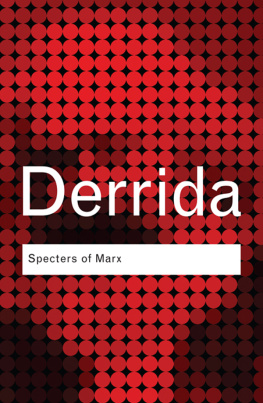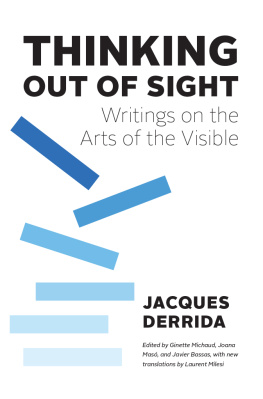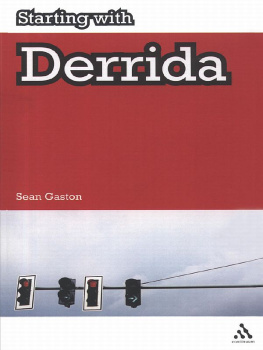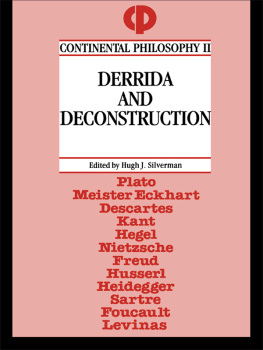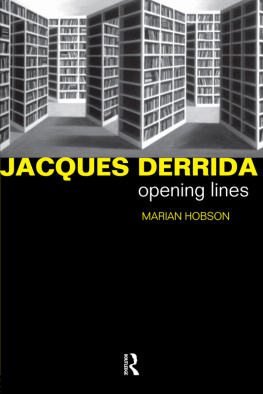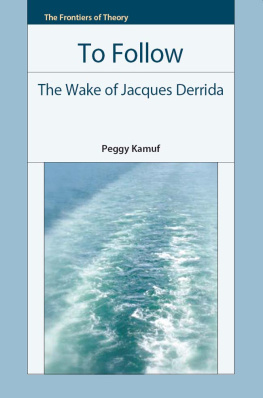Jacques Derrida - Writing and difference
Here you can read online Jacques Derrida - Writing and difference full text of the book (entire story) in english for free. Download pdf and epub, get meaning, cover and reviews about this ebook. year: 1981, genre: Religion. Description of the work, (preface) as well as reviews are available. Best literature library LitArk.com created for fans of good reading and offers a wide selection of genres:
Romance novel
Science fiction
Adventure
Detective
Science
History
Home and family
Prose
Art
Politics
Computer
Non-fiction
Religion
Business
Children
Humor
Choose a favorite category and find really read worthwhile books. Enjoy immersion in the world of imagination, feel the emotions of the characters or learn something new for yourself, make an fascinating discovery.

- Book:Writing and difference
- Author:
- Genre:
- Year:1981
- Rating:5 / 5
- Favourites:Add to favourites
- Your mark:
- 100
- 1
- 2
- 3
- 4
- 5
Writing and difference: summary, description and annotation
We offer to read an annotation, description, summary or preface (depends on what the author of the book "Writing and difference" wrote himself). If you haven't found the necessary information about the book — write in the comments, we will try to find it.
Writing and difference — read online for free the complete book (whole text) full work
Below is the text of the book, divided by pages. System saving the place of the last page read, allows you to conveniently read the book "Writing and difference" online for free, without having to search again every time where you left off. Put a bookmark, and you can go to the page where you finished reading at any time.
Font size:
Interval:
Bookmark:

JACQUES DERRIDA
WRITING AND DIFFERENCE
Translated, with an Introduction and Additional Notes, by ALAN BASS
The University of Chicago Press
The University of Chicago Press, Chicago 60637
Routledge & Kegan Paul Ltd, London and Henley
First published as L'criture et la diffrence 1967 by Les ditions du Seuil
1978 by The University of Chicago
All rights reserved. Published 1978
Printed in the United States of America
24 23 22 21 20 19 18 17 18 19 20 21 22 23
ISBN: 978-0-226-50283-0
ISBN: 978-0-226-81607-4 (ebook)
Library of Congress Cataloging-in-Publication Data
Derrida, Jacques.
Writing and difference.
Translation of L'criture et la diffrence.
Includes bibliographical references.
1. PhilosophyAddresses, essays, lectures. I. Title.
B2430.D482E5 1978 100 77-259533
ISBN 0-226-14329-5 (paper)
 The paper used in this publication meets the minimum requirements of the American National Standard for Information SciencesPermanence of Paper for Printed Library Materials, ANSI Z39.48-1992.
The paper used in this publication meets the minimum requirements of the American National Standard for Information SciencesPermanence of Paper for Printed Library Materials, ANSI Z39.48-1992.
Le tout sans nouveaut qu'un espacement de la lecture
Mallarm, Preface to Un Coup de ds
Translators Introduction
Contents
Translator's Introduction
Par la date de ces textes, nous voudrions marquer qu linstant, pour les relier, de les relire, nous ne pouvons nous tenir gale distance de chacun deux. Ce qui reste ici le dplacement dune question forme certes un systme. Par quelque couture interprtative, nous aurions su aprs-coup le dessiner. Nous nen avons rien laiss paratre que le pointill, y mnageant ou y abandonnant ces blancs sans lesquels aucun texte jamais ne se propose comme tel. Si texte veut dire tissu, tous ces essais en ont obstinment defini la couture comme faufilure. (Dcembre 1966.) This note originally appeared appended to the bibliography of Lcriture et la diffrence, a collection of Derridas essays written between 1959 and 1967 and published as a volume in the latter year. A glance at the list of sources (p. 341 below) will show that although Derrida has arranged the essays in order of their original publication, the essay that occupies the approximate middle of the volume was actually written in 1959, and therefore precedes the others. Before translating the notein fact one of the most difficult passages in the book to translatelet us look at what Derrida said about the chronology of his works up to 1967 in an interview with Henri Ronse published in Lettres franaises, 612 December 1967 and entitled Implications. (This interview, along with two others, has been collected in a small volume entitled Positions, Paris: Editions de Minuit, 1972.) Hopefully this discussion of chronology will serve to orient the reading of Writing and Difference, and to clarify why the essay that is in many respects the first oneGenesis and Structure and Phenomenologyoccupies the middle of the volume.
The year 1967 marks Derridas emergence as a major figure in contemporary French thought. La voix et le phnomne (translated by David Allison as Speech and Phenomena, Evanston: Northwestern University Press, 1973), a work devoted to analyzing Husserls ideas about the sign, and De la grammatologie (translated by Gayatri Spivak as Of Grammatology, Baltimore: Johns Hopkins University Press, 1976), devoted mainly to Rousseaus Essay on the Origin on Languages seen in the light of the history of the idea of the sign, both appeared in 1967, along with L'criture et la diffrence. In response to Ronses question about how to read these three books published one on the heels of the other, Derrida first says that De la grammatologie can be considered a bipartite work in the middle of which one could insert Lcriture et la diffrence. By implication, this would make the first half of De la grammatologiein which Derrida demonstrates the system of ideas which from ancient to modern times has regulated the notion of the signthe preface to L'criture et la diffrence. It would be useful to keep this in mind while reading Lcriture et la diffrence, for while there are many references throughout the essays to the history of the notion of the sign, these references are nowhere in this volume as fully explicated as they are in the first half of De la grammatologie. Derrida explicitly states that the insertion of L'criture et la diffrence into De la grammatologie would make the second half of the latter, devoted to Rousseau, the twelfth essay of L'criture et la diffrence. Inversely, Derrida goes on to say, De la grammatologie can be inserted into the middle of L'criture et la diffrence, for the first six essays collected in the latter work preceded en fait et en droit (de facto and de jurea favorite expression of Derridas) the publication, in two issues of Critique (December 1965 and January 1966), of the long essay which was further elaborated into the first part of De la grammatologieour preface by implication to L'criture et la diffrence. The last five essays of L'criture et la diffrence, Derrida states, are situated or engaged in louverture grammatologique, the grammatological opening (Positions, p. 12). According to Derridas statements a bit later in the interview, this grammatological opening, whose theoretical matrix is elaborated in the first half of De la grammatologiewhich, to restate, systematizes the ideas about the sign, writing and metaphysics which are scattered throughout L'criture et la diffrencecan be defined as the deconstruction of philosophy by examining in the most faithful, rigorous way the structured genealogy of all of philosophys concepts; and to do so in order to determine what issues the history of philosophy has hidden, forbidden, or repressed. The first step of this deconstruction of philosophy, which attempts to locate that which is present nowhere in philosophy, i.e., that which philosophy must hide in order to remain philosophy, is precisely the examination of the notion of presence as undertaken by Heidegger. Heidegger, says Derrida, recognized in the notion of presence the destiny of philosophy, and the reference to the Heideggerean deconstruction of presence is a constant throughout Derridas works. (Indeed, the reader unfamiliar with Heidegger may well be mystified by Derridas frequent references to the notion of presence as the central target in the deconstruction of philosophy.) The grammatological (from the Greek gramma meaning letter or writing) opening consists in the examination of the treatment of writing by philosophy, as a particularly revelatory symptom (Positions, p. 15) both of how the notion of presence functions in philosophy and of what this notion serves to repress. Derrida arrived at this position through a close scrutiny of the philosophical genealogy of linguistics, especially the philosophical treatment of the sign. From Plato to Heidegger himself, Derrida demonstrates, there is a persistent exclusion of the notion of writing from the philosophical definition of the sign. Since this exclusion can always be shown to be made in the name of presencethe sign allegedly being most present in spoken discourseDerrida uses it as a symptom which reveals the workings of the repressive logic of presence, which determines Western philosophy as such.
Font size:
Interval:
Bookmark:
Similar books «Writing and difference»
Look at similar books to Writing and difference. We have selected literature similar in name and meaning in the hope of providing readers with more options to find new, interesting, not yet read works.
Discussion, reviews of the book Writing and difference and just readers' own opinions. Leave your comments, write what you think about the work, its meaning or the main characters. Specify what exactly you liked and what you didn't like, and why you think so.



